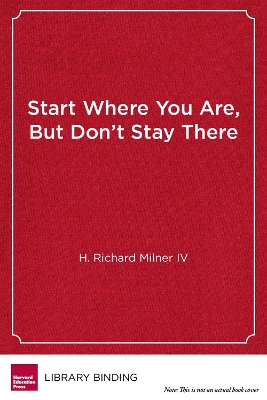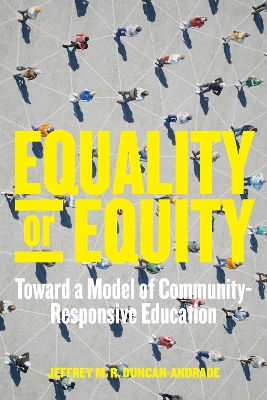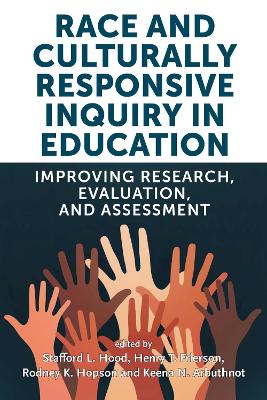Race and Education
3 total works
Start Where You Are, But Don't Stay There addresses a crucial issue in teacher training and professional education: the need to prepare pre-service and in-service teachers for the racially diverse student populations in their classrooms. A down-to-earth book, it aims to help practitioners develop insights and skills for successfully educating diverse student bodies. The book centers on case studies that exemplify the challenges, pitfalls, and opportunities facing teachers in diverse classrooms. These case studies - of white and African American teachers working (and preparing to work) in urban and suburban settings - are presented amid more general discussions about race and teaching in contemporary schools. Informing these discussions and the cases themselves is their persistent attention to opportunity gaps that need to be fully grasped by teachers who aim to understand and promote the success of students of greatly varying backgrounds. Start Where You Are, But Don't Stay There arises out of recent scholarship about race and education, but it is more directly inspired by the pressing need for useful and credible guidance for professional educators in diverse classrooms. It will prove indispensable to teachers, administrators, and scholars alike.
Equality or Equity sets forth a compelling argument urging us to shift our understanding of the role of our education system from providing equal opportunity to building an equitable society.
A leading scholar-practitioner and ardent proponent of culturally responsive forms of education, Jeffrey M. R. Duncan-Andrade aims to settle the debates over whether we should work toward a public education system built on the goal of equality, in which identical resources are provided for all students, or equity, in which different resources are offered in response to differences in student interests and needs. Duncan-Andrade centers his argument on the importance of creating meaningful education experiences for all students, particularly for low-income students of color and immigrant students, who have gained relatively fewer benefits from decades of equality-focused education reform.
Drawing on research from across a range of disciplines, including neuroscience, social epidemiology, public health, and social work, Duncan-Andrade introduces three essential domains of a pedagogy that are both culturally and community responsive: relationships, relevance, and responsibility. He enlists the voices of practitioners to provide grounded examples of what community-responsive pedagogy looks like in each of these domains. These examples demonstrate how equitable classroom practices can enrich student engagement, enhance trauma responsiveness, and improve educational outcomes.
Equality or Equity makes an urgent appeal for designing and implementing a truly equitable school system and shows us how we can begin to accomplish that goal.
A leading scholar-practitioner and ardent proponent of culturally responsive forms of education, Jeffrey M. R. Duncan-Andrade aims to settle the debates over whether we should work toward a public education system built on the goal of equality, in which identical resources are provided for all students, or equity, in which different resources are offered in response to differences in student interests and needs. Duncan-Andrade centers his argument on the importance of creating meaningful education experiences for all students, particularly for low-income students of color and immigrant students, who have gained relatively fewer benefits from decades of equality-focused education reform.
Drawing on research from across a range of disciplines, including neuroscience, social epidemiology, public health, and social work, Duncan-Andrade introduces three essential domains of a pedagogy that are both culturally and community responsive: relationships, relevance, and responsibility. He enlists the voices of practitioners to provide grounded examples of what community-responsive pedagogy looks like in each of these domains. These examples demonstrate how equitable classroom practices can enrich student engagement, enhance trauma responsiveness, and improve educational outcomes.
Equality or Equity makes an urgent appeal for designing and implementing a truly equitable school system and shows us how we can begin to accomplish that goal.
Race and Culturally Responsive Inquiry in Education
by Stafford L. Hood, Rodney K. Hopson, Henry T. Frierson, Keena N. Arbuthnot, and H. Richard Milner
Published 11 October 2022
Race and Culturally Responsive Inquiry in Education examines how assumptions about race and culture have shaped US education research and the interpretation and implementation of its results.
This ambitious volume sheds light on the detrimental effects of educational praxis and policies that have characterized communities of color and historically underserved communities as deficient. It reveals how such bias has affected many facets of educational inquiry, from research design and planning to education policy making and evaluation practices. The provocative essays in this work challenge traditional suppositions about whose evidence matters, highlighting approaches for reframing educational inquiry and arguing for the adoption of a culturally responsive stance that can correct inequities by accounting for students’ diverse backgrounds and needs.
Edited by Stafford L. Hood, Henry T. Frierson, Rodney K. Hopson, and Keena N. Arbuthnot and featuring contributions from leading and emerging scholars, the collection is organized around three key areas—education research, educational assessment, and program evaluation. The contributors identify provocative problems that exist at the intersection of race and education in these areas, and they illuminate the many ways in which education reform can address intersectionality. Calling for effective action, they suggest compelling solutions for consideration by policy makers and practitioners as well as researchers.
Together, the essays in this volume make the case that culturally responsive methods that deepen our understanding of educational disparities, appropriately measure what students know and can do, and ensure that we have accurate information about the effectiveness of educational interventions can improve educational outcomes for diverse learners.
This ambitious volume sheds light on the detrimental effects of educational praxis and policies that have characterized communities of color and historically underserved communities as deficient. It reveals how such bias has affected many facets of educational inquiry, from research design and planning to education policy making and evaluation practices. The provocative essays in this work challenge traditional suppositions about whose evidence matters, highlighting approaches for reframing educational inquiry and arguing for the adoption of a culturally responsive stance that can correct inequities by accounting for students’ diverse backgrounds and needs.
Edited by Stafford L. Hood, Henry T. Frierson, Rodney K. Hopson, and Keena N. Arbuthnot and featuring contributions from leading and emerging scholars, the collection is organized around three key areas—education research, educational assessment, and program evaluation. The contributors identify provocative problems that exist at the intersection of race and education in these areas, and they illuminate the many ways in which education reform can address intersectionality. Calling for effective action, they suggest compelling solutions for consideration by policy makers and practitioners as well as researchers.
Together, the essays in this volume make the case that culturally responsive methods that deepen our understanding of educational disparities, appropriately measure what students know and can do, and ensure that we have accurate information about the effectiveness of educational interventions can improve educational outcomes for diverse learners.


